Talking to the students
Posted in Industry Rants, Tales from the grind-stone on November 22nd, 2007 by MrCrankySo, since I didn’t have any pressing deadlines this week, I agreed to visit Paisley University and give a talk to the undergraduates there. Sorry, University of the West of Scotland:Paisley Campus (that’s soo got to bite them in the arse when it comes to their stationary). As an industry, I think we’ve somewhat dug ourselves into a hole in the past few years, by cutting back on hiring new people (and instead insisting on experience); now we’re facing a talent shortage, especially on the software side. We’ve seen the error of our ways now, and I see more adverts for graduates again, but that dry spell will no doubt have diminished our talent pool enough that it will take years to restore.
Nothing in the talk was particularly enlightening I’m sure, but I tried to impart a few of the things that you learn after your first years in the games industry: how to write a good CV, what it’s like working at smaller or larger companies, how to spot when your company’s about to go down the tubes. You know the sort of thing – stuff that no-one will tell you before you actually get your job, the sort of stuff you learn in the pub after work. I always remember talks from industry people when I was at Edinburgh, and they almost invariably had people saying “this is our company, look at how shiny it is, here’s our token recently hired graduate, listen to him tell you how shiny it is”. It was always about the potential for recruiting the graduates, and glossing over all the potential downsides.
So I tried to give a balanced view of the industry: a quick summation of the current state of the business, the potential likelihood that your employer will make you work unpaid overtime to ship the game, and the likelihood that the company folds while you’re still working there. Of course, I tried to stress the up-sides as well: the joy involved in making games, the rewards involved in shipping a title that people love. I hope it came out fairly balanced. Otherwise I must look like a bit of a numpty – why would I still be working in the games industry if the pros didn’t outweigh the cons?!
Anyway, if it didn’t come across in the talk, I’ll say it now – making games is great. It’s fun, it’s rewarding, and I find it hard to imagine how a job in the regular software industry would compare. Sure, there’s less money in games, but the non-monetary rewards are many.

